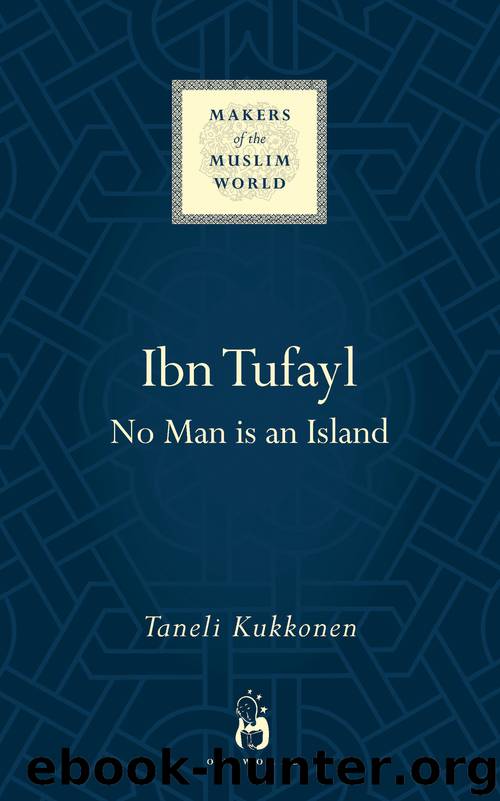Ibn Tufayl by Kukkonen Taneli;

Author:Kukkonen, Taneli;
Language: eng
Format: epub
Publisher: Oneworld Publications
Published: 2014-09-26T04:00:00+00:00
THE SPIRIT WHICH IS GOD’S
All this is highlighted in the scene-setting preamble in which Hayy is born spontaneously out of the earth’s bowels, “without a mother or father” as Ibn Tufayl puts it.
According to Ibn Tufayl, everything begins with the earth’s clay. The optimal climate ascribed to Hayy’s equatorial island (see chapter 3) allows for the development of an ideal admixture of the four primary qualities of hot, cold, dry, and moist. Such a “maximal state of equilibrium” (27) forms the material basis for the emergence of a particularly exalted form of life. The more even the balance between the primary qualities in a body, the more complex modes of existence become feasible, Hayy later theorizes, and this goes hand in hand with a firmer purchase on life, since a more stable equilibrium is less liable to be threatened by opposing qualities eroding and eventually overwhelming it. (This accords with Arabic medical theory, which likewise placed great emphasis on a balance between the humors as the key to longevity.) In Aristotelian terms, different passive potentialities – capacities for becoming something or other – ride on different material constitutions.
However, being suited for life does not yet entail possessing it. Ibn Tufayl steadfastly maintains that a thing’s material constitution itself does not yield its form: the form is something added to the corporeal, and as such it is something imparted from the outside. Aristotle had pressed the same point by saying that any passive potential for a specific form, residing as it does in a material subject (Gr. hypokeimenon, Ar. mawdu‘), depends for its realization on something that already actually possesses the requisite form or feature. Aristotle’s intention in emphasizing the priority of the actual had been wholly naturalistic. For Aristotle, a hot thing imparts heat to whatever is apt to be heated, and analogously, a parent organism imbues suitably disposed matter with a form identical to its own – as Aristotle puts it, one human being always begets another (Physics, II.7; Metaphysics, XII.3).
Ibn Tufayl, by contrast, takes his cues from Ibn Sina, whose aims in advancing this argument were considerably more otherworldly. Ibn Sina says that the emergence of form requires the agency of something transcending the whole system of bodies, an immaterial “Giver of Forms,” as he calls it. Similar to this, Ibn Tufayl affirms through Hayy’s investigations that not a single form, whether living or inert, comes to be or is sustained in existence without the outflow, or emanation (fayd), of a divine power and agency (86). The language of emanation was appropriated from pseudo-Aristotelian works such as the Theology of Aristotle – in reality, adaptations of Greek Neoplatonic treatises. When Ibn Tufayl talks about divine craftsmanship (Arabic san‘a: Hayy, 88–90), he is alluding to the same phenomenon.
Ibn Tufayl sets up an extended analogy to illustrate the idea. The starting point is to compare the outflow of energy from the divine to the sun’s life- and light-granting properties. Recounting how some bodies reflect the sun’s rays not at all,
Download
This site does not store any files on its server. We only index and link to content provided by other sites. Please contact the content providers to delete copyright contents if any and email us, we'll remove relevant links or contents immediately.
| Africa | Americas |
| Arctic & Antarctica | Asia |
| Australia & Oceania | Europe |
| Middle East | Russia |
| United States | World |
| Ancient Civilizations | Military |
| Historical Study & Educational Resources |
Cecilia; Or, Memoirs of an Heiress — Volume 1 by Fanny Burney(32075)
Cecilia; Or, Memoirs of an Heiress — Volume 3 by Fanny Burney(31469)
Cecilia; Or, Memoirs of an Heiress — Volume 2 by Fanny Burney(31419)
The Secret History by Donna Tartt(18216)
Sapiens: A Brief History of Humankind by Yuval Noah Harari(13997)
Leonardo da Vinci by Walter Isaacson(12813)
The Radium Girls by Kate Moore(11636)
Sapiens by Yuval Noah Harari(5126)
How Democracies Die by Steven Levitsky & Daniel Ziblatt(4969)
The Wind in My Hair by Masih Alinejad(4852)
Homo Deus: A Brief History of Tomorrow by Yuval Noah Harari(4694)
Endurance: Shackleton's Incredible Voyage by Alfred Lansing(4517)
Man's Search for Meaning by Viktor Frankl(4298)
The Silk Roads by Peter Frankopan(4275)
Millionaire: The Philanderer, Gambler, and Duelist Who Invented Modern Finance by Janet Gleeson(4114)
The Rape of Nanking by Iris Chang(4024)
Hitler in Los Angeles by Steven J. Ross(3803)
Joan of Arc by Mary Gordon(3794)
The Motorcycle Diaries by Ernesto Che Guevara(3793)
